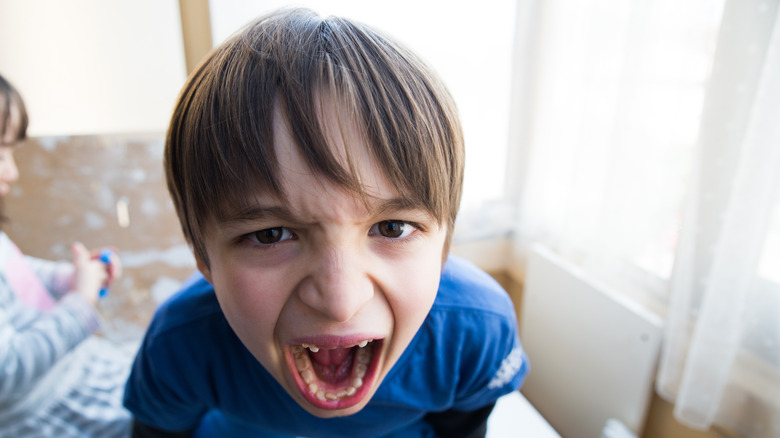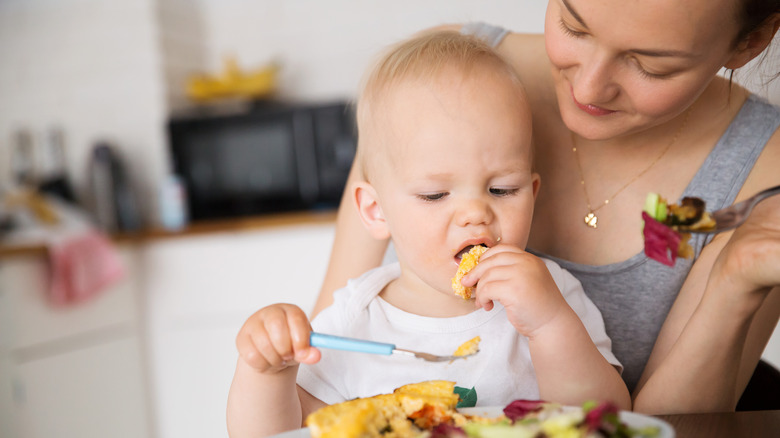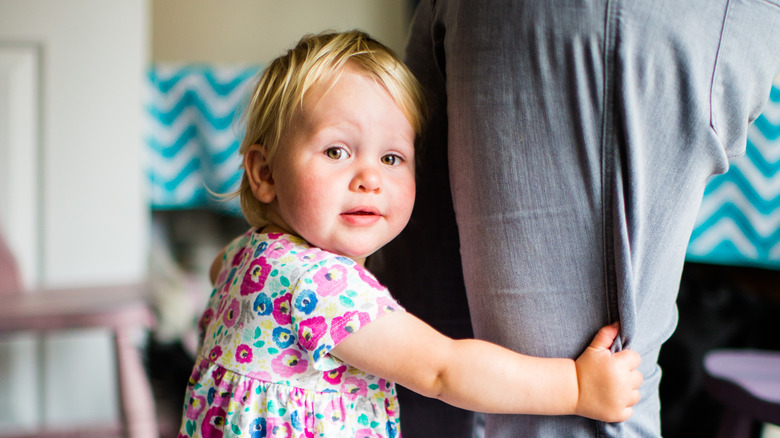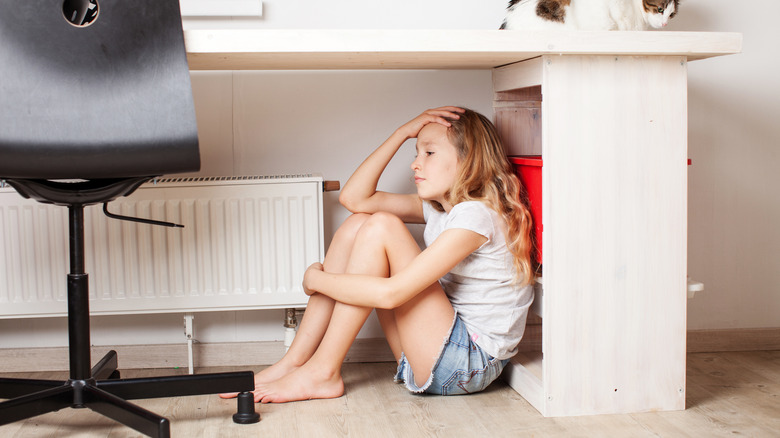Serious Problems Caused By Incorrect Parenting
Parenting mistakes happen to all of us and if there is any article I would be afraid to read, it would be one with this title. As a parent, I am constantly second-guessing every decision I make. Am I being too stern, too laid back, not fun enough? I have literally had all of these thoughts, often in the same day, so the fact that I could cause serious harm based on my own mistakes is terrifying.
Luckily, knowing the mistakes ahead of time is powerful. We parents are all doing the best we can with what we have, so understanding the outcomes of certain parenting mistakes only helps us empower and love our children even more.
The problems are serious and include behaviors like negative body image, aggression, and low frustration tolerance. However, the more aware of these problems we can be, the better we can prevent them.
Inability to express fear
The world can feel like a scary place, and many of us are unsure how to explain current events to our children. We're worried that we are going to say the wrong thing, but the true parenting mistake is shutting down the conversation entirely.
When we don't allow our kids to talk about what frightens them, perhaps because we're too uncomfortable, they receive the message that is not okay to express emotions. This is especially important today, as it is impossible to turn on the news without hearing about scary events happening all over the world.
"The number one mistake parents make is not talking to their kids about terrorism," Psychiatrist Carole Lieberman told me. "This makes kids feel confused and gives them the message that they are just supposed to stuff the feelings down that they have about terrorism, which I describe as scared, sad, mad, and bad."
Negative body image
As the mother to a daughter, I know that how I talk about exercise and healthy eating is going to affect her own self image. I am constantly catching myself and trying to use more empowering language. According to a study in the Archives of Pediatric and Adolescent Medicine, mothers who are overly concerned about their own weight pass on those same insecurities to their children. The best thing we can do for our children is to have a positive attitude around our bodies and how we take care of ourselves.
"Research shows that, in general, people that diet still weigh more than their peers," Alison E. Field, study author and assistant professor of pediatrics at Children's Hospital Boston told The Harvard Crimson. "The most important thing to do is for families to focus less on weight and more on eating healthier and exercising, and promoting a better way of life."
Even though it feels like our kids tune us out much of the time, they are always listening. We don't even have to mention the child's weight at all to have an effect. "While it's less likely that parents are directly saying something about their children's weight, a mother's desire to become thinner can directly impact her children's attitude," Field explained. "We often see weight as being an issue for teenage girls, but this study shows that mothers are often more concerned about weight than their children."
Lack of financial knowledge
I used to think that I was just bad with money. I spent more than I made, never built up my savings, and had no idea how much I was contributing to my 401K. Once I took accountability for my actions, I realized that I had just never learned about money management. Growing up, money was not something we talked about, and that is a parenting mistake I'm working to avoid with my own family.
"Just as big as sex, money is crucial for children to understand from an early age. Money management, setting goals with money, and understanding charity are crucial life skills," David Ezell, licensed counselor and clinical director of Darien Wellness, told me.
Children need their parents to teach them these crucial life skills or they risk making poor financial decisions in the future. A study in Communication Research Reports found that when parents don't talk about money with their children, it affects them. "The takeaway here is that even young kids are aware of financial issues, regardless of whether parents talk with them about money," study author Lynsey Romo told NC State News. "And if parents aren't talking with their kids about subjects like family finances or debt, the kids are drawing their own conclusions — which may not be accurate. Even if parents don't want to discuss family finances with their children, it may be worthwhile to explain why they don't want to discuss that topic."
Inability to trust in relationships
As parents, we have the awesome responsibility of setting the tone for our relationships with our children. When we are consistent, our kids know they can count on us. However, when we make the parenting mistake of being vague or inconsistent, our children never know when to trust us.
"When parents are inconsistent, it results in ineffective parenting, vague instructions, poor modeling of follow-through, and confusion for the child regarding expectations and family rules," Mayra Mendez, a licensed marriage and family therapist told me. "Inconsistent ground rules and unclear behavioral expectations disrupt learning and the child's ability to trust the caregiving relationship. Inconsistency also disrupts the modeling process as the child is given mixed messages and resulting in unreliable and undependable models of behaviors."
The best strategy is to always be consistent, especially with consequences for negative behavior. "Set clear limits and boundaries and consistently follow-through with the established ground rules. Parents who model consistent responding reinforce trust and dependability in the parent-child relationship," explained Mendez. "When parenting is consistent, the need for frequent negative interactions decreases, and the quality of the relationship strengthens for both parents and children. Remaining firm and clear teaches children accountability for their actions."
Poor coping skills
We have all seen that parent at the park who gives in to every tantrum. He already told his child that it was time to go, but quickly backed off when the screaming started. In addition to being controlled by a toddler, this parent's mistake is actually depriving his child of crucial coping skills.
"Parents who give in to all the desires of the child and avoid setting limits or responding to opportunities for developmental guidance, because they want to be the child's friend or fear displeasing the child, disrupt social emotional progress," Mendez explained. "Children look to trusted caregivers to set examples and model problem solving. Giving in to a child's whim teaches entitlement and interferes with the child developing coping skills to manage disappointment."
To instill strong coping skills, set clear boundaries and don't back down when your child balks at them. "Provide clear structure, calm instructions, and set reasonable and developmentally appropriate limits to support social-emotional growth," advised Mendez. "Responsible parenting involves setting limits in a compassionate and empathic manner."
Never crying
Seeing your child cry is painful for any parent. However, just because the tears may make us uncomfortable, it is important not to shut them down. We as parents have the opportunity to help teach our children how to handle their emotions, so making the parenting mistake of trying to stop the crying without addressing the cause only teaches them to stuff their emotions down.
"How children navigate their emotional world is critical to lifelong success," Psychologist Susan David told the New York Times. Helping our children feel their emotions and move on will serve them much better down the road. "When we're saying 'don't be sad, don't be angry, don't be jealous, don't be selfish,' we're not coming to the child in the reality of her emotion," explained David. "Validate and see your child as a sentient person who has her own emotional world."
Letting the tears roll is even healthy for your child. A study in the journal Frontiers in Psychology found that crying is how children self-soothe and even has mood-boosting benefits. So next time your son is losing it over his ice cream falling on the ground, let him feel those feelings, and then move on.
Fear of failure
When we parents become overly excited about the school solar system project, we may have the tendency to take over, rather than provide support. If we make a habit of the parenting mistake of taking over and providing too much guidance, our children hear the message that it is not okay for them to try new things and make mistakes.
"Children learn through play, and play includes struggling, making mistakes, and making changes or accommodations," said Mendez. "When parents are constantly guarding, guiding, and correcting children, they reinforce fear of failure and, more importantly, children will have difficulty learning how to collaborate with others, consider change or alternative options, share with others, or develop good sportsmanship."
It is crucial for parents to allow their children creative time when they are free to make mistakes. "Consider free play, exploration, and opportunities for imaginary expression as equally important to learning enrichment. Ensure that children have opportunities to play and experiment to reinforce self-confidence and practice navigating life," shared Mendez. "Encourage enjoyment in playing games and relating empathically with others rather than making winning or being first the objective of engagement. Encouraging children to explore their natural talents and discriminate between likes and dislikes supports emotional growth."
Aggression
We parents are human and sometimes lose our tempers. I hate those moments when I lose it and yell, especially over something small, but it does happen. The problem comes when yelling is a regular part of the day, especially from fathers.
"Young children are extremely prone to being traumatized, especially when males, including fathers, yell at them in anger. Mothers can still traumatize young children, but it take a lot more than for a father," Psychiatrist Scott Carroll told me. "The child may not specifically remember the yelling, but they learn to fear instead of trust the parent and often have problems with anxiety and feeling insecure. Alternatively, the child, especially boys, can identify with the adult that yells and become angry and aggressive."
Eating issues
Growing up, I was a proud member of the clean plate club. I loved being praised for finishing my entire meal, and so I always did it. Unfortunately, encouraging our children to clean their plates at every meal is a parenting mistake that can lead to serious weight and eating issues down the road.
"There is a lot of research that shows this parenting mistake leads to overeating and obesity as an adult," warned Carroll. "Most importantly, it teaches the child to ignore their natural cues of hunger and instead eat based on external cues. Instead, trust the child when they say they are hungry or not, unless it is an obvious manipulation to eat candy or dessert instead of dinner."
Codependent tendencies
Speaking of parents becoming too involved in their children's lives, if we make this parenting mistake we are not just teaching them to avoid making mistakes — we are also sending the message that we don't think they can do it on their own.
"Parenting that strives to prevent children from experiencing challenges, disappointments, controversy, or dislikes inadvertently [denies] children the opportunity to learn from their mistakes and take responsibility for their own actions," explained Mendez. "Over-protecting children interferes with the development of effective frustration tolerance, problem solving, and regulation. Children need to learn how to manage difficult emotions such as anger and disappointment. Over-protecting children from challenging emotions denies them the opportunity to prepare for the life. Over-protection breeds dependency on others and reduces the capacity for resiliency and self-efficacy."
I want my children to feel confident in their abilities to solve problems. Even though it is extremely uncomfortable at times, I do my best to let them fail and try again. "Allow children to explore, make mistakes, face challenges, and experience emotions," shared Mendez. "Provide children with opportunities to practice skills safely and promote learning to enhance self-confidence and independence in children. By allowing children space to try new adventures and consider choices, parents support the growth of a trusting relationship with children."
Distant relationship with parents
Raising children is one of the hardest things you will ever do. Any parent's job is difficult, but parents going through a divorce have even more challenges to work through. One potential parenting mistake for divorced or separated parents is putting down the other parent in front of the children. Doing this only harms your relationship with your child.
"When you speak disrespectfully about your children's other parent, they are often hurt and riddled with guilt and confusion," Rosalind Sedacca, a certified divorce coach, told me. "Their thinking is, 'If there's something wrong with Dad or Mom, there must also be something wrong with me for loving them.' This can result in damaging your own relationship with your children, as well."
Low frustration tolerance
We know that trying to protect our children from any disappointment is not serving them long-term. In addition to depriving them of crucial coping skills, we're setting them up for major problems down the road.
"One of the biggest mistakes we continually see parents make is not allowing their children to experience difficulties in life. With every best intention, parents overprotect and coddle their children in an attempt to keep their children from experiencing frustration, which results in something we call 'low frustration tolerance,'" Courtney Rodrigue, a licensed mental health counselor, told me. "When children have low frustration tolerance, they are unable to tolerate uncomfortable situations, painful emotions, and other difficulties of life, which in turn can contribute to anxiety, depression, addictions, compulsive behaviors, and anger."
Low self-image
Literally every parent I know feels stretched thin much of the time. We are constantly juggling work projects with changing school schedules, friend issues, and doctor's appointments. It is no wonder that we feel like there is never enough time. When it comes to our children, however, it's time to make the time. Appearing too busy and disinterested with your children is a parenting mistake that affects them in ways big and small, starting with their self-image.
"It's difficult to motivate yourself to want more, strive for more, and imagine that you deserve more when your parents or other primary caregivers didn't pay attention — as if your greatest achievements weren't worth noticing," Psychologist Suzanne Lachmann wrote in Psychology Today. "This scenario often results in feeling forgotten, unacknowledged, and unimportant later."
Dr. Lachmann explained that when it feels as though your accomplishments are never acknowledged, it is easy to feel as though nothing really matters. "Feeling unrecognized can result in the belief that you are supposed to apologize for your existence," she explained.
Unhappy mothers
Parenting mistakes do not just have consequences for our children. We parents can suffer from our own mistakes as well. For example, putting too much pressure on ourselves as mothers will lead to dissatisfaction with ourselves. A study in the Journal of Child and Family Studies reported that those Pinterest-perfect mothers we all measure ourselves up to are actually quite unhappy.
"If intensive mothering is related to so many negative mental health outcomes, why do women do it? They may think that it makes them better mothers, so they are willing to sacrifice their own mental health to enhance their children's cognitive, social, and emotional outcomes," explained the study authors. "In reality, intensive parenting may have the opposite effect on children from what parents intend."
Low satisfaction in college
College is this magical time of total freedom with zero responsibility. I would be hard pressed to think of someone I know who wouldn't go back to college, if even for a day, if they could. However, parents can have an impact on how much our children enjoy their college experience.
A study in the Journal of Child and Family Studies found that college students who describe their parents as controlling are more likely to feel depressed. "Students who reported having over-controlling parents reported significantly higher levels of depression and less satisfaction with life," the study authors wrote. "Furthermore, the negative effects of helicopter parenting on college students' well-being were largely explained by the perceived violation of students' basic psychological needs for autonomy and competence."
Disrespectful behavior
I was recently waiting in line in a busy clothing store and couldn't take my eyes off one little boy in the store. He was running around, knocking over displays, and yelling at his mother. The shocking part was that his mother didn't react. I overheard her telling others in line that her son was overtired from a long day at school, but she never addressed his behavior. When he ran into me without looking, no one stopped him to make him apologize. Sometimes we parents are so focused on what is going on with our own children, that we forget about the long-term consequences of parenting mistakes like not providing enough discipline.
"We live in an extraordinarily child-centered age," Psychologist Richard Weissbourd told Boston Magazine. "So much attention has been paid moment to moment on our kids' feelings that we have sidelined caring for other people and respect."















